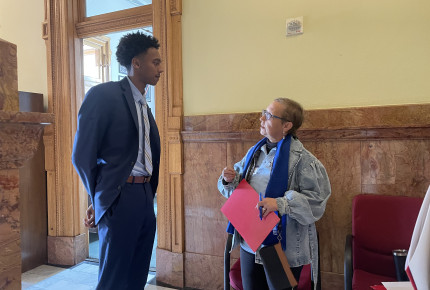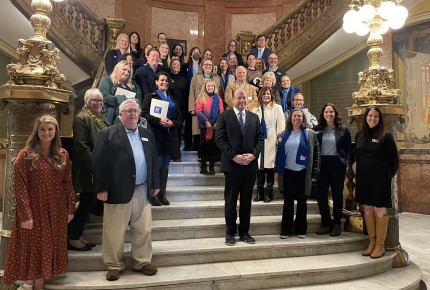Cancer Survivors to Governor, Legislators: Expand Access to Biomarker Testing in Colorado
Advocates urge lawmakers to support ‘game-changing’ legislation for cancer care
DENVER, COLO. – March 8, 2023 - The American Cancer Society Cancer Action Network (ACS CAN) hosted ‘Cancer Action Day’ at the state capitol Wednesday. ACS CAN volunteers, including cancer survivors, patients, and caregivers met with several lawmakers and urged them to support and pass House Bill 1110, Healthcare Coverage for Biomarkers Testing. The bi-partisan legislation would expand equitable access to biomarker testing statewide.
Biomarker testing has become a game-changing part of cancer care in recent years. It’s a necessary first step in opening the door to targeted treatments that can lead to improved survivorship and quality of life. After a cancer diagnosis, biomarker testing can help connect patients with the right treatment at the right time. As a result, patients may be able to avoid unnecessary treatments with potentially life-altering side effects.
Unfortunately, too many Coloradans still can’t access biomarker testing. Despite the enormous benefits, insurance coverage is failing to keep pace with innovations and advancements in biomarker testing and treatment. As a result, some patients are left with the decision of paying for testing out-of-pocket or going without this information. Unfortunately, not all communities—especially those who are marginalized--are benefitting from the latest advancements in biomarker testing and precision medicine.
Elizabeth Melachrinoudis, Miss Denver and cancer advocate was one of dozens of volunteers who met with Governor Polis and lawmakers. She lost both of her parents to cancer by age 20.
“ACS CAN is here today to advocate for a world where Coloradans diagnosed with cancer have a better chance of survival to be around for their loved ones,” said Melachrinoudis. “My parents didn’t get to watch me graduate with my master’s degree last December but if biomarker testing had been available to them, and opened the door to a targeted therapy, they might’ve been able to be there.”
If passed, HB 1110 would require state-regulated insurance companies, including Medicaid, to cover comprehensive biomarker testing for patients who need it when supported by medical and scientific evidence.
“If biomarker testing would’ve been available in my case, I likely would’ve been diagnosed between two and five years sooner than when my reoccurrence was discovered,” said Sabrina Wright-Hobart, volunteer and stage four breast cancer survivor. “Expanding access to biomarker testing gives Coloradans hope for a more positive outlook after being diagnosed with cancer.” 
In 2023, more than 28,000 Coloradans are expected to be diagnosed with cancer, with more than 8,000 people projected to die from the disease. Cancer is the leading cause of death nationwide among Hispanic/Latino people, and Black/African American populations are dying from cancer at a rate disproportionate to White populations.
Without action on biomarker testing, existing disparities in cancer outcomes by race, ethnicity, income, and geography could increase. To date, four states across the country have passed legislation expanding access to biomarker testing, including Arizona.
